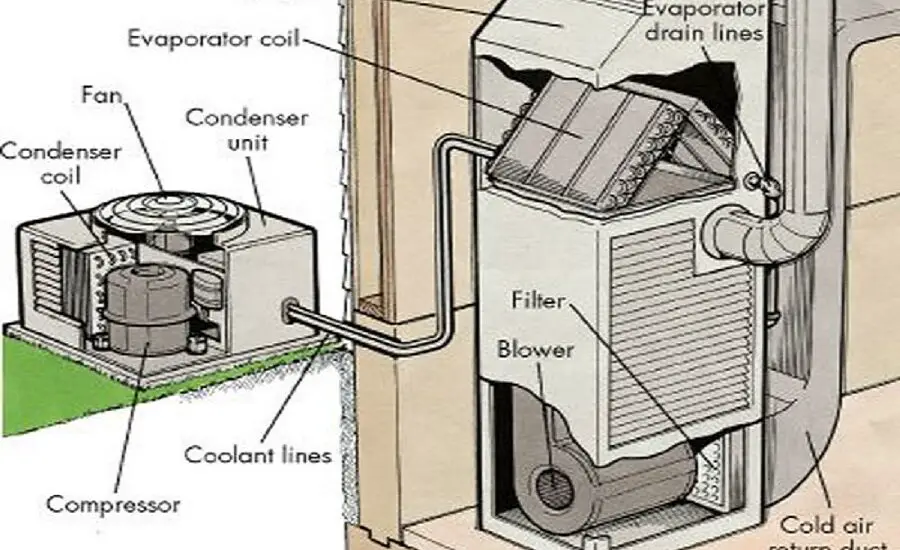Evaporator coil – ever heard of it? It’s the unsung hero of your HVAC system, working tirelessly to keep you cool and comfortable. In this article, we’ll dive into what an it is, how it functions, and how to maintain it for optimal performance.

Table of Contents
Definition and Overview
So, what is an evaporator coil, and why should you care? This is a crucial component of your HVAC system, responsible for cooling and dehumidifying the air in your home. It’s the magic behind the scenes that makes your living space a haven on hot summer days.
Types of Evaporator Coils
Not all evaporator coils are created equal. There are three main types: A-frame, N-coil, and slab. Each one has its own unique features and benefits, so it’s essential to choose the right one for your system.
Evaporator Coil Function
Role in HVAC Systems
What’s the deal with these coils? Why are they so important? It’s simple: they’re responsible for two crucial functions in your HVAC system – cooling and dehumidification. Let’s break it down, shall we?
Components and Materials
The evaporator coil is made up of copper or aluminum tubing, a finned surface, and refrigerant. These materials work together in harmony to create the perfect cooling environment.
The Refrigeration Cycle
Ever wonder how your HVAC system cools your home? It’s all about the refrigeration cycle: evaporation, compression, condensation, and expansion. This beautiful dance of temperature and pressure keeps your home cool and comfortable.
How Evaporator Coils Work
Cooling Process
Here’s the scoop: the evaporator coil absorbs heat from your indoor air and transforms the refrigerant from a liquid to a gas. It’s like a superhero, sucking up the heat and banishing it from your home!
Temperature and Pressure Relationship
Low-pressure, low-temperature environment inside the evaporator coil; high-pressure, high-temperature environment outside. This dynamic duo creates the perfect conditions for heat transfer and cooling.
Dehumidification Process
Did you know that evaporator coils also help remove moisture from your indoor air? As air passes over the coil, condensation forms on its surfaces, effectively dehumidifying your space. Talk about a multitasker!
Importance of Proper Sizing
Size matters when it comes to evaporator coils. Ensuring proper sizing is crucial for maximum efficiency and avoiding issues like short cycling or insufficient cooling. Don’t underestimate the power of a perfectly sized coil!
Read our other articles on evaporators in refrigeration – Evaporators in Refrigeration: Easy Guide to Understanding Your Fridge’s Unsung Hero
Maintenance and Troubleshooting of Evaporator Coils Common Problems
These coils play a crucial role in the operation of an air conditioning or refrigeration system. They are responsible for absorbing heat from the air, allowing the refrigerant to evaporate, and ultimately cooling the space. To ensure the proper functioning of these coils, regular maintenance and troubleshooting are essential. Below, we outline some common problems and their solutions:
Dirty or Clogged Coils
Over time, dust, dirt, and debris can accumulate on evaporator coils, reducing their efficiency and impeding airflow.
Maintenance: Regularly clean the coils using a soft brush or a vacuum cleaner with a brush attachment. Be gentle to avoid damaging the fins. Additionally, change or clean the air filters regularly to reduce debris build-up.
Troubleshooting: If the coils are still dirty after cleaning, consider using a non-acidic coil cleaner. Follow the manufacturer’s instructions for the proper application.
Frozen Coils
Insufficient airflow or a refrigerant leak can lead to ice formation on the evaporator coils, reducing cooling capacity and potentially damaging the system.
Maintenance: Check for proper airflow by ensuring that the blower fan is functioning correctly, vents are open, and air filters are clean. Regularly inspect the refrigerant lines for leaks and address them promptly.
Troubleshooting: If the coils are frozen, turn off the system to allow them to thaw. Once thawed, inspect the system for airflow issues or refrigerant leaks and address them as needed.
Refrigerant Leaks
Leaks in the evaporator coils or refrigerant lines can result in reduced cooling capacity and damage to the compressor.
Maintenance: Regularly inspect the evaporator coils and refrigerant lines for signs of leaks, such as oil stains or refrigerant hissing. Schedule annual maintenance with a professional technician to ensure the system is leak-free.
Troubleshooting: If a refrigerant leak is detected, contact a licensed technician to repair the leak and recharge the system. Do not attempt to handle refrigerant yourself, as it can be hazardous.
Damaged or Bent Fins
The fins on evaporator coils can become bent or damaged, which restricts airflow and reduces the system’s efficiency.
Maintenance: Regularly inspect the fins for damage and straighten them gently with a fin comb if necessary.
Troubleshooting: If the fins are severely damaged or corroded, consider replacing the evaporator coil. Consult a professional technician to determine the best course of action.
Sensor or Control Problems
Issues with the thermostat, sensors, or other control components can lead to improper evaporator coil operation.
Maintenance: Ensure the thermostat is functioning correctly and is set to the proper temperature. Regularly check sensors and controls for proper operation.
Troubleshooting: If you suspect a sensor or control problem, consult a professional technician to diagnose and repair the issue.
Regular maintenance and troubleshooting of evaporator coils can help prevent these common problems, ensuring the efficient operation of your air conditioning or refrigeration system. Always consult a professional technician if you are unsure how to address a specific issue or if the problem persists.
Conclusion
The Importance of Evaporator Coils in HVAC Systems
So, there you have it – the lowdown on evaporator coils. These hardworking components are the key to maintaining comfort and efficiency in your home. With proper care and maintenance, your evaporator coil will keep you cool and comfortable for years to come. So, show your coil some love, and it’ll love you right back!